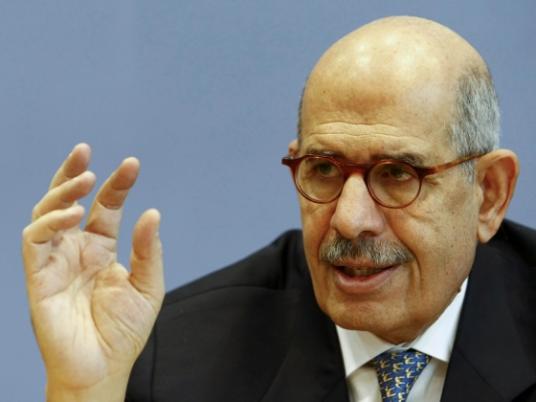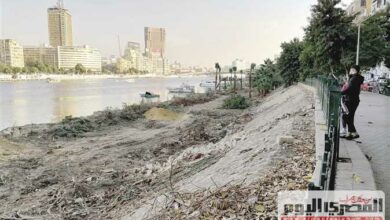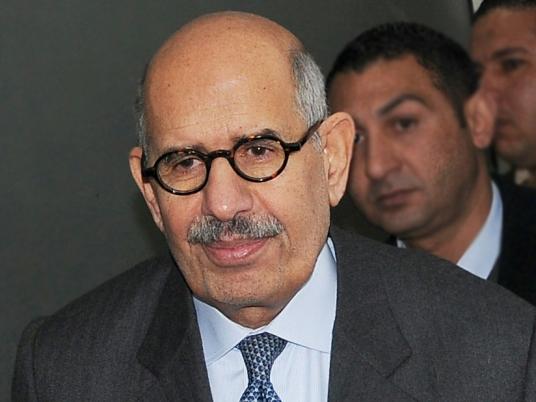
The National Salvation Front on Saturday delineated 11 conditions that would ensure the integrity of the upcoming parliamentary elections, for which preliminary procedures are set to begin on 26 February.
The coming election is a decisive battle pitting the NSF, which brings together 13 political powers spanning the political spectrum, against Islamists, whose domination over the political sphere in a sense created the opposition from which the NSF was born.
Parties of all shades are frantically gearing up for the House of Representatives race, which comes on the heels of the new Constitution, passed with a 63.8 percent referendum vote in which there was a lower turnout than in any poll in the past two years.
The tumultuous constitution-writing process created deep rifts between the country’s divergent forces, from the Constituent Assembly formation to the rushed approval of more than 200 articles and the snap decision to hold the referendum.
The NSF formed within this volatile climate, thus coalescing the opposition, which must now jostle for a place in Parliament.
The most prominent NSF parties include the Dostour Party, led by former International Atomic Energy Agency chief Mohamed ElBaradei; the Egyptian National Congress Party, headed by former Arab League chief Amr Moussa; and the Popular Current, founded by leftist former presidential candidate Hamdeen Sabbahi.
Among other conditions, the NSF demand judicial supervision over every ballot box, a spending ceiling for electoral campaigning, and the prohibition of using houses of worship for campaigning.
The NSF says it is setting up three committees. One would establish the criteria upon which NSF members would be chosen for candidacy. A second committee would look into funding for the elections, and a third would monitor and document electoral violations.
Shaping Egypt’s future
The majority in the new House of Representatives will form the Cabinet and pass a plethora of vital legislation to restructure state institutions, as laid out in the Constitution.
For this reason, many say this parliament will be of utmost significance, in that it is expected to set the tone for post-uprising political and economic development.
But just ahead of the most crucial and decisive of political battles, there are already signs of divisions within the NSF, which threaten its chances of challenging Islamists’ cohesion. Islamist groups excel at organizing their ranks before pivotal polls, conveying a unified vision and clear philosophy that have so far earned them parliamentary and political gains.
Hassan Abu Taleb, an expert at the Al-Ahram Center for Political and Strategic Studies, says the NSF was mainly created to oppose President Mohamed Morsy’s 22 November constitutional declaration, with which he granted himself sweeping powers by immunizing his decisions from reversal or judicial review.
While the NSF was able to mobilize the masses to protest the constitutional declaration, Abu Taleb says, it later became apparent that the NSF lacked a long-term political vision.
Many have argued it was indeed the masses who took to the streets first, out of their own volition, thus creating a suitable environment for a legitimate opposition, more or less, forcing the long-scattered political players to unite.
“The future of the NSF depends on its ability to run as one bloc in the elections, and any divisions threaten its goal of countering the Islamist current. But the power of the front will be lost in internal battles between parties over the percentage of representation in the coming House of Representatives,” Abu Taleb predicts.
These flaws date back to before the revolution, and have constantly impeded the formation of a strong, united political opposition. Abu Taleb adds that there are NSF members who insist on making the divisive distinction between revolutionary and non-revolutionary powers within the front.
How many lists?
The NSF’s cohesion has been faltering ever since amendments to the law organizing parliamentary elections were proposed two weeks ago.
The draft says two-thirds of the House of Representatives will be elected through closed proportional lists and one-third through the single-winner system.
Before this, NSF leaders had said they would contest the elections on one list comprising of candidates from the diverse parties. Now, members of the NSF are considering running on two lists, thus risking scattering votes.
One camp within the NSF believes it should run a unified list in the country’s 46 constituencies. Proponents of this view include the Free Egyptians and Wafd parties, both of which prefer to avoid splintering votes, and instead capitalize on the popular bases they have in all governorates.
The other camp’s preference for two lists stems from an attempt to contain the anger of young members of other NSF parties, namely Dostour and the Popular Current, which oppose the presence of members they see as affiliated with the now-dissolved National Democratic Party.
These youth want to segregate revolutionary members and others, mainly from the Wafd and Congress parties, arguing that both of these parties have former NDP members among their ranks.
In an interview with Al-Masry Al-Youm this week, Sabbahi said the issue is not how many lists to run on, but rather that individual constituencies should be examined to determine how much clout civil powers have there.
Sabbahi adds that having two lists responds to the demands voiced by younger NSF members, who think they would have better chances in the elections this way — one list to attract the votes of youth who supported the revolution and another to lure more conservative voters.
Mahmoud al-Alaily, assistant secretary general of the Free Egyptians Party, says the NSF’s elections committee decided to have one list, dismissing Sabbahi’s view.
Wafd Party leader Essam Shiha, meanwhile, says it is only acceptable to have two lists for 10 percent of constituencies, where some parties are proven to have significant popularity. Having a list to attract young voters, he says, is not “politically pragmatic.”
He says it is not true that the Wafd, Congress and Free Egyptians parties will include former NDP members on their lists. It is not even possible, says Shiha, since Article 232 of the Constitution prohibits senior NDP members and political bureau members who ran in the 2005 and 2010 elections from participating in the upcoming race.
While these total about 1,400, Shiha says, there are more than 2 million former NDP members who were on local councils or part of the disbanded party’s secretariats in governorates. They are popular and belong to big families, especially in Upper Egypt, he says, adding that the front should make good use of them.
“Young members of Dostour and the Popular Current should be well aware of the rules of the political game, because we are now playing politics; we are no longer in the midst of a revolution,” he adds.
Al-Shorouk newspaper reported Wednesday that NSF sources said the priority for candidacy would be given to former MPs and those who are popular, be they members of big families or labor leaders.
Ahmed Saeed, Free Egyptians Party chief, submitted a proposal at the NSF meeting Sunday suggesting a mechanism for choosing which candidates to field in the elections, whereby parliamentary hopefuls are given points on the basis of their ability to compete.
Abu Taleb, meanwhile, says the front has multiple leaders, crippling its decision-making capabilities.
“It seems that the political calculations of each party will determine the rules of the game and the criteria for choosing the candidates. ElBaradei and Sabbahi are wary of allying with remnants of the former regime, to avoid unrest within their parties. The Wafd and Congress parties, meanwhile, will not give up on NDP tactics, which call for depending on members of big families,” he says.
But eventually, parties cannot ignore the wishes of their supporters, he adds.
It may be inevitable that parties which offer the most campaign financing have the final say on the configuration of lists, particularly Wafd and the Free Egyptians.
“From now until elections, anything can happen. There may be even more than two lists, and entire parties may withdraw from the NSF,” he says.
Opposition still weak
In the first post-revolution Parliament, the Freedom and Justice Party won 236 seats. The Nour Party and other Salafi groups won 121 seats, the Wafd Party 39 seats, and the Egyptian Bloc 36 seats. All in all, Islamists seized over 70 percent of Parliament.
Several observers see the civil opposition’s performance in that Parliament as unconvincing and unorganized, mainly due to the lack of a unified platform and relatively low representation.
Some fear the same scenario will play out once again.
Alaily says the NSF is an electoral rather than ideological alliance, and so it will not have one electoral platform. Sabbahi, meanwhile, says the front tasked leftist economist Ahmed al-Sayed al-Naggar with preparing a plan that would achieve social justice and steer clear of free-market policies.
Samer Atallah, economics professor at the American University in Cairo, says it is impossible for NSF parties to agree on one platform for a specific legislative agenda, particularly regarding economic legislation.
“It is illogical, for instance, for the Free Egyptian Party, for which the key to achieving social justice is equal opportunity, to ally with the Popular Socialist Alliance Party, for which social justice means distribution of wealth,” he explains.
With the upcoming parliamentary majority expected to form the Cabinet and amend laws regarding state institutions, and with Islamists projected to win a parliamentary majority, the opposition should have some MPs with political experience, understanding of legislation, and an ability to maneuver, Abu Taleb says.
So far, the NSF is not focusing on these issues, and has not announced specific philosophy on legislation, he adds, and these defects risk taking the opposition back to square one.
This article was translated from Arabic by Dina Zafer.




